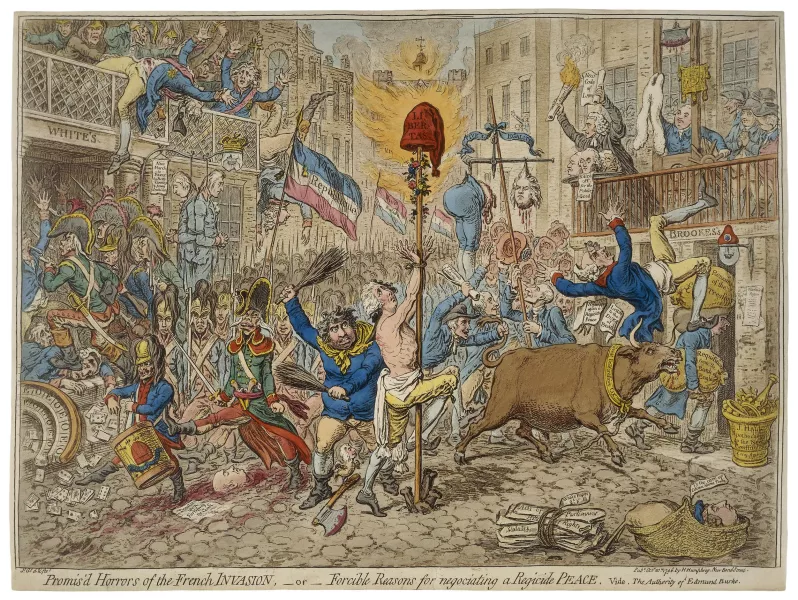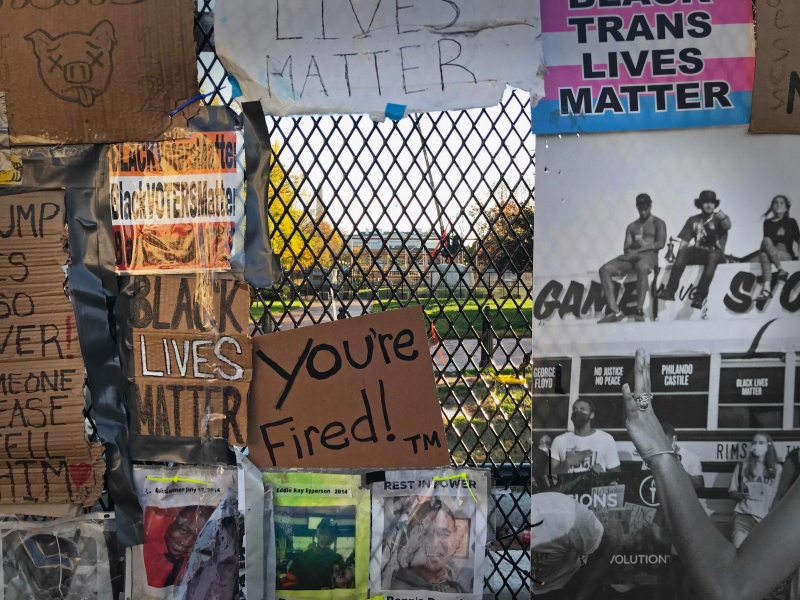What exactly did we witness on January 6, 2021? On that day and the days following, politicians and the media experimented with a variety of terms to describe this protest-turned-riot, this planned attack that seemed entirely unplanned, this farrago of menace, bacchanal, insouciance, and chilling coordination. The most apt term is probably insurrection—a rebellion in miniature. But of all the terms tried and tested (coup, uprising, the wonkish putsch) the most potent and problematic of these is “terrorism.” Only hours after the zip-tie brandishing, live-streaming mob had been ejected from the building, Republicans and Democrats were briefly united by language as senators from both parties denounced “domestic terrorism” perpetrated by a group of “thugs.” More than all the other possible appellations, “terrorism” is the open sesame, an incantation with the power to move the imagination and the gears of government. While “insurrection” has a slightly fusty, tricorn-and-muskets quality about it, “terrorism” feels irresistibly urgent and dangerously modern. Above all, the invocation of “terrorism” creates a narrative that is at least partly predetermined. We may not know exactly what an insurrection looks like, but we have plenty of expectations about how a terrorist attack should look.
That both Republican and Democratic lawmakers felt the need to qualify the Capitol attack as “domestic” terrorism is not insignificant. Both “terrorism” and its companionate “thug” imply a foreignness, a racially coded form of criminality and an essential illegality. In the case of “thug,” such foreignness is embedded in the word’s colonial history. “Terrorism,” other hand, also a loanword (from the French terrorisme) and a neologism of the 1790s, initially referred to the violent actions of a government against its own citizens. Robespierre famously sought to align terror with virtue as a distinct revolutionary principle, but in the aftermath of the Terror, “terrorism” emerged as a damning descriptor for the actions of the recently deposed Jacobin government. As the word was adopted into English, it was applied as a descriptor for violence by subjects against their own government as well as to the violent actions of a government against its own citizens. Either way, there is nothing more domestic than terrorism. Its original purpose was not to identify the horrors of a foreign attack, but the trauma of autochthonous implosion.
Terrorism’s slide into foreignness has a long and complex history, but we can speculate that, its ability to galvanize governmental action aside, the usefulness and comfort of the word “terrorism” in the context of the Capitol attack is the implication that the violence we witnessed was an aberration or somehow outside of American history, and not the culmination of longer and entangled narratives of racial grievance, class inequality, disinformation, and historical myopia. Wielding our contemporary understanding of terrorism as a surprise shock from elsewhere, then, becomes a way to inoculate America from its own worst self, and to push it to the borders. It’s unsurprising that some scholars have objected to labeling the Capitol attack as terrorism on the grounds that expanded anti-terrorism legislation, even if formed with the intent of countering domestic terrorism, may have the reverberative effect of increasing the surveillance and harassment of immigrants and religious minorities.
But it is also possible that reckoning with the longer history of terrorism forces us to confront rather than circumvent uncomfortable truths. I began this reflection by stating that the Capitol attack was properly described as an insurrection—a violent uprising against government—but the most remarkable aspect of this insurrection is that it was fomented by governmental leaders and involved members of the military and police. Can what happened at the Capitol be considered an insurrection against the government if it was actively encouraged by some of the leaders of that same government? Seen in this light, the Capitol attack was a quintessential act of terrorism, if we understand terrorism not as a manichean struggle between good guys and bad guys, insiders and outsiders, but as originally occupying a disturbingly liminal area between state and anti-state violence. Terrorism may be the only word to describe a violence that was partly abetted by the very powers it attacked.
One might legitimately ask why it matters whether we label this an act of terrorism, or insurrection, or whatever. It has always mattered. In The Fire Worshippers, an elaborately allegorical reflection on English colonialism in Ireland, Thomas Moore—indecisive Irish nationalist but highly perceptive poet—wryly notes the magical effect a single word can have on shaping collective perception:
Rebellion! foul, dishonouring word,
Whose wrongful blight so oft has stain'd
The holiest cause that tongue or sword
Of mortal ever lost or gain'd.
How many a spirit, born to bless,
Hath sunk beneath that withering name,
Whom but a day's, an hour's success
Had wafted to eternal fame!
Consider that many people in the Capitol attack referred to it as the opening salvo of a “revolution,” thus justifying their violence in the arc of American history. “Revolution” is a word that has now acquired the sheen that Moore identified in the word “liberty,” which he describes in the same poem as a “spell-word,” or rebellion’s legitimating inverse. Consider that even after an entire year of events that should properly transcend political partisanship, acts of terror are still being spun through the centrifuge of extremist right-wing media and emerging as acts of revolution. Signification has never seemed so pointless and so urgent.
We may also feel compelled to resist labeling the Capitol attack as terrorism because it seemed, somehow, simply ridiculous, lacking the deathly grandeur of the destruction of the Twin Towers, that emblematic terror spectacle. The awful sublimity of giant airplanes crashing into giant buildings has been replaced by the tedious analysis of deciphering the QAnon Shaman’s runic tattoos. But, as Napoleon ruefully observed about the retreat from Moscow, the sublime and ridiculous eventually intersect. From this perspective, the Capitol attack’s strange mixture of absurdity and menace— terror arriving via not a dark-skinned stranger but a guy named Baked Alaska—is a terrorism that is strikingly reminiscent of depictions of the French Revolution as a coalescence of the carnivalesque and the terrible. Take, as only one example, Gillray’s Promis’d Horrors of the French Invasion, or Forcible reasons for negotiating a Regicide Peace (1796), a response to the publication, in the same year, of the first of Edmund Burke’s Letters on a Regicide Peace. In these letters, which were written to protest peace negotiations with the French government, Burke describes Jacobinism as an enemy both tangible and intangible, an “armed doctrine” that, left unchecked abroad, will embolden conspirators at home and usher in systemic devastation. In Gillray’s caricature, it’s not entirely clear where the real locus of danger lies. True, French forces led by a conspicuously racialized soldier wearing the colors of a Haitian volunteer legion march down St. James’s Street on the left, but scenes of civil unrest and violence appear in the foreground, dominated by the central image of Charles James Fox thrashing a shirtless William Pitt. In Gillray’s vision, the French seem like a pretext for the unleashing of violent forces deep within the heart of Britishness. Amidst scenes both horrifying and hysterical (William Grenville’s dismembered body gently dripping blood, the Duke of Bedford in the flesh of a bull tossing Burke into the air), a remarkable lot of paper flies around, one sheet resting in a pool of blood. This is Burke’s armed doctrine, torn in our own era into a thousand digital shards.


